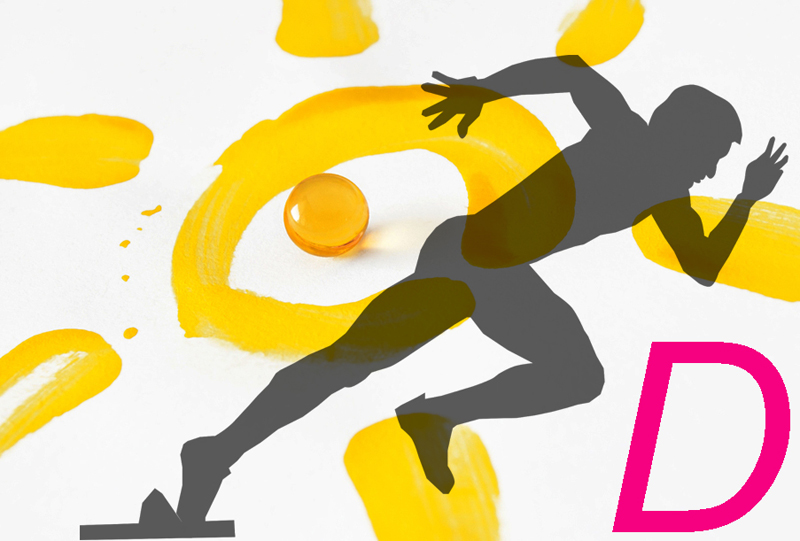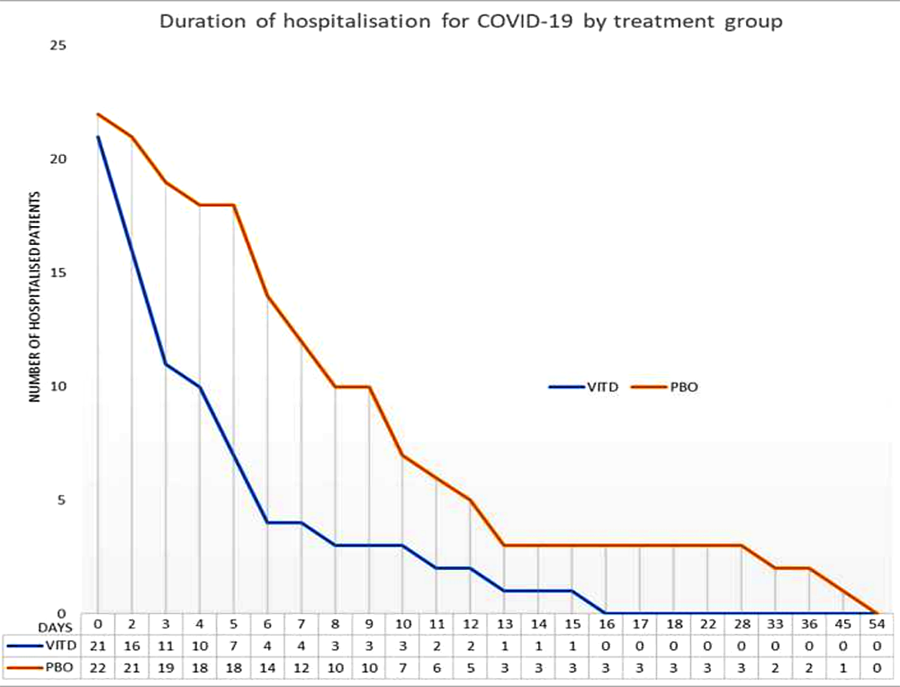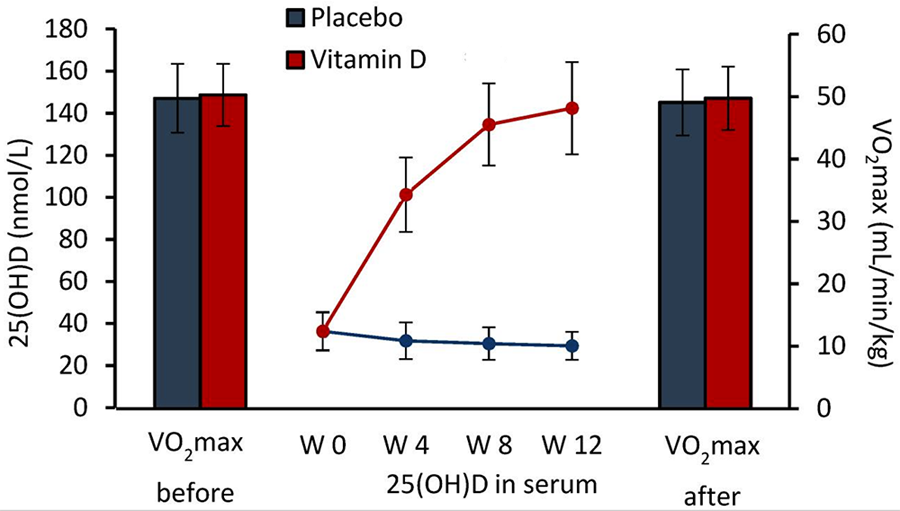You are viewing 1 of your 1 free articles. For unlimited access take a risk-free trial
Vitamin D and the athlete: what it can really do for you
Recent research suggests that an optimum vitamin D status can bring numerous health and performance benefits. But can it enhance endurance in athletes? SPB looks at the latest evidence
Of all the nutrients required for human health, it is without doubt vitamin D that has attracted the most attention over recent years. This perhaps is hardly surprising; although the importance of vitamin D for bone health has long been understood, more recent evidence has demonstrated that optimum intakes of vitamin D in adults (either through diet, supplements or sun exposure [where vitamin D can be synthesized in the skin]) provides significant protection from age-related degenerative diseases such as heart disease, multiple sclerosis and a number of different cancers(1,2).
Winter and vitamin D
Perhaps even more relevant for athletes training in mid winter (in the northern hemisphere at least), the data is now conclusive that your vitamin D status is intimately linked to your immune function. In a nutshell, a sub-optimum vitamin D status harms immunity, whereas an optimum vitamin D intake improves immunity.
A 2019 systematic review study (pooling the data from 14 other studies on vitamin and immunity) found that the lower the level of vitamin D in the blood, the higher the risk of an acute and severe respiratory tract infection (including covid-19(3) – see figure 1), and the more severe it was likely to be – especially when levels of vitamin D in the blood dropped below 37.5ng/L(4).
Moreover, studies on athletes undergoing hard training have found conclusive evidence that a sub-optimum vitamin D status leads to more frequent, longer duration and more severe upper respiratory tract infections (URTIs - coughs, colds sore throats etc) compared to athletes whose vitamin D status is sufficient(5,6), and that supplementing extra vitamin D during the winter months reduces the incidence and impact of URTIs(7).
Figure 1: Vitamin D therapy and covid-19 outcomes*
Data not only shows that a better vitamin D status reduces the risk of a severe covid infection and death(3), but also that treatment of patients with 25,000IUs of vitamin D per day for four days upon admission to hospital with covid 19 also dramatically improves outcomes. In the graph above, the blue plot represents vitamin D-treated patients upon hospital admission while the orange plot shows non-treated patients. The vitamin D-treated patients recovered more rapidly and left hospital sooner. * Data from Niet et al, ‘Positive Effects of Vitamin D Supplementation in Patients Hospitalized for COVID-19: A Randomized, Double-Blind, Placebo-Controlled Trial’, Nutrients. 2022 Aug; 14(15): 3048.
Vitamin D, muscle function and fitness
To say that maintaining an optimum vitamin D status (see how later) helps athletes perform at their best is no exaggeration; as all athletes know, taking time out of training because of illness throws a massive spanner into the development of fitness, and can also be very dispiriting as you watch your hard-earned training gains slip away!
However, more recently, scientists have begun to investigate whether an optimum or improved vitamin status can directly boost muscle function and cardiovascular fitness, thereby giving athletes an immediate performance edge. In a 2021 review paper on the role of vitamin D in muscle function, exercise and sports injury recovery, the researchers concluded the following(8):
- Acute micro-damage to muscle fibers that occur naturally during intense training, increases the expression of vitamin D receptors in muscle tissue, suggesting that the muscles are primed to take up more vitamin D (for healing).
- A vitamin D deficiency appears to adversely affect mitochondrial function by reducing adenosine triphosphate (ATP – the key energy currency molecule in the body) production.
- Low levels of vitamin D increase markers of muscle stress, damage and fatigue.
- Higher levels of vitamin D in the body are correlated with less post-exercise muscle weakness.
- Vitamin D supplementation can improve the speed of functional muscle recovery in muscles following repetitive eccentric contractions (the contractions most likely to produce muscle damage to fibers).
- A poorer vitamin D status seems to be linked to an increased occurrence of sport-related muscle injury, as evidenced by data from swimmers, elite ballet dancers and National Football League.
Taken overall, these findings suggest that when an athlete’s muscular system is under stress, an optimum vitamin D status seems to be an important component in the quest for recovery!
Vitamin D and endurance performance
The results above certainly suggest that an optimum vitamin D intake can play a vital role in maximizing the ability of your muscles to recover. However, while speeding recovery post-exercise is absolutely vital (see this article for an in-depth look at nutritional recovery strategies) for long-term performance, this study didn’t find any immediate and direct performance benefits from boosting vitamin D intake. However, it only looked at muscle function and recovery post exercise. It specially did not look at measures of cardiovascular (aerobic) performance and how they might be affected by vitamin D status. At this point, you might be wondering why and how vitamin D status could impact on cardiovascular and endurance performance?
Well, maximal oxygen uptake – more commonly referred to as VO2max, and defined as the maximal rate of oxygen consumption by the body during prolonged high-intensity exercise - is considered the most fundamental measure of cardiorespiratory fitness(9). The major factors determining VO2max are the functional capacity of the lungs, pumping capacity of the heart, the ability of the blood and vascular system to deliver oxygen to the working muscles, and the ability of these muscles to absorb and use oxygen. It turns out that all of these tissues and organs have vitamin D receptors, which implies that they need a certain level of vitamin D to function optimally(10-14).
Given the above, some scientists have begun to wonder if cardiorespiratory fitness could be linked to vitamin D status, with higher levels of VO2max more likely in those with an optimum vitamin D status, and lower VO2max levels in those who are vitamin D deficient. A 2019 study by US scientists looked at this question by testing a randomized sample of 1,995 adults between the ages of 20 and 50 for their vitamin D status and measuring VO2max levels(15).
What they found was the participants in the highest quartile of vitamin D levels had a significantly higher VO2max (around 4.3mls/kg/min) than participants in the lowest quartile. When correcting for confounding factors (factors that could have skewed the results such as sex, age, race, BMI etc), the differences remained. In fact, for each additional 10nmol/L of vitamin D in the blood, VO2max rose by between 0.5 to 0.75mls/kg/min!
What about studies on vitamin D supplementation and improvements in VO2max? Here the picture gets rather muddy because most studies have concluded that vitamin D supplementation has no significant impact on VO2max in subjects, regardless of age, training status, and pre-existing blood vitamin D levels(16-20). However, just to confuse matter further, some recent studies, carried out over the past four years, have reported a positive effect including VO2max gains in professional soccer players(21) and recreational athletes(22,23).
New research
To try and clarify whether or not extra vitamin D really can improve VO2max in athletes undergoing training, brand new research by Estonian scientists on the effects of supplementing vitamin D over a 12-week training period has just been published(24). Appearing in the journal ‘Nutrients’, this study looked at whether supplementing a very generous amount of vitamin D (8000IUs per day) was able to positively impact VO2max in 39 young men undergoing a 12-week resistance training program.
To try and make the study as relevant as possible, the participants were screened so that only those with a sub-optimal vitamin D status (under 50nmol/L) were included. In other words, if there is a real effect of giving extra vitamin D, it should be observed in these men because they were known to have a sub optimal vitamin D status at the start of the study. In addition to VO2max, the participants were also assessed for markers of inflammation and muscle damage before, during and after the 12 weeks, and VO2max tests were also carried out. The participants were randomly assigned to one of the two groups:
- Supplemental group who took vitamin D (8000IUs daily).
- Placebo group, who took an identical looking capsule containing inert oil only.
The 12-week training program consisted of seven exercises on resistance training machines for both upper and lower body muscles, performed three times per week and supervised. Training loads were gradually increased according to improvements in participants’ performances during the 12-week training period, and after training, participants in both groups ingested 25 grams of a whey-based supplement (to maximize recovery in both groups – ie to help establish whether vitamin D supplementation provided any additional performance benefits).
What they found
Once the data was analyzed, there were three main findings:
- In the vitamin D group, supplementation raised the blood levels of vitamin D from around 35nmol/L (mildly deficient) up to 140nmol/L (optimal and above). The placebo group however experienced a slight decline – see figure 2.
- There were no improvements in VO2max in either group. In other words, the vitamin D supplementation had no effect despite raising blood levels by nearly 4-fold – see figure 2.
- Markers of inflammation (measured by something called the ‘serum interleukin-10/tumour necrosis factor alpha ratio’ fell) in the vitamin D group but remain unchanged in the placebo group.
Figure 2: Changes in vitamin D status and VO2max(24)
Despite a nearly 4-fold increase in blood vitamin D levels from deficient to optimal and higher, the vitamin D group experienced no VO2 max gains compared to the placebo (deficient) group.
Conclusions and practical advice for athletes
While optimizing vitamin D status has been shown to provide health and immunity benefits, and potentially improves muscle recovery and protects against injury, this study suggests that taking extra vitamin does not directly improve aerobic capacity. The evidence here is very robust; not only were all the subjects known to be vitamin D deficient at the start of the study (ie those who might be expected to benefit the most), they also took a high dose of vitamin D for an extended period of time, thus bringing their vitamin D status into the high category. If there was a direct effect of vitamin D on VO2max, you would expect it to be observed in these conditions.
One caveat however is that in this study, the training undertaken was purely of a resistance nature – not endurance training. There remains the possibility that improved VO2max gains observed in some studies following supplementation may have occurred via improved endurance training adaptation, enhanced by higher levels of vitamin D over a period of endurance training. Suffice to say however that knowing what we currently do, athletes should not regard vitamin D as an endurance enhancer.
Of course, this one negative finding regarding vitamin D doesn’t mean that vitamin D nutrition can be neglected by endurance athletes. The above study showed a very significant decrease in markers of inflammation and muscle damage when vitamin D status was improved. Given that reduced inflammation is associated with reduced muscle soreness(25,26), an optimum vitamin D status should be regarded as important for any athlete in any discipline who undertakes hard training. Indeed, add in the health, immunity and recovery benefits, and the need to optimize and maintain your vitamin D status is a complete no brainer. If you’re not 100% sure how to achieve this, the box below provides a number of practical tips to ensure you get to and remain in the top vitamin D league!
Optimizing your vitamin D: practical tips
- Try to consume plenty of vitamin D-rich foods at all times of the year. These foods include oily fish (such as salmon, trout, herring and sardines), eggs, milk (which is fortified), butter and some margarines. Be aware that many otherwise nutritious foods such as vegetables, fruits, grains, cereals, pulses, nuts and seeds contain very little vitamin D.
- If you live more than 30o north or south of the equator, consider supplementing vitamin D during the winter months (when the sun is too weak to enable your skin to synthesize vitamin D).
- The further north or south you live, the lengthier the period of supplementation is required over winter (ie the greater the need to start earlier and finish later).
- The darker your skin color, the greater the need for vitamin D supplementation at any given latitude (higher melanin levels in darker skin are more effective at blocking vitamin D producing UV rays). Black athletes living at northerly latitudes need to be particularly cautious in this respect.
- When choosing a vitamin D supplement, always choose the more biologically active vitamin D3 over D2.
- Vitamin D supplementation requirements during the winter months will vary according to skin type and latitude, but will typically be around 2,000-4,000IUs per day.
- To confirm your current vitamin D status, considered getting it checked – either through your physician or using a home blood-testing kit.
- If your blood level is below 75nmol/L, consider supplementing with 2000-4000IU of vitamin D3 (not D2) per day until your status is improved – regardless of season.
- During the summer months, try to regularly expose your skin to some strong sunshine for 5-15 minutes before covering up or applying sunscreen/sun block. Regular sun exposure can help build up your body’s vitamin D stores in readiness for the winter months ahead.
- Consider a winter break nearer to the equator to boost your flagging vitamin D levels!
References
- Mol Nutr Food Res. 2010 Aug;54(8):1164-71
- BMJ 2014;348:g1903
- Int J Mol Sci. 2021 Oct; 22(19): 10559
- Int J Environ Res Public Health. 2019 Aug 21;16(17). pii: E3020
- Exerc Immunol Rev. 2013;19:86-101
- Int J Environ Res Public Health. 2018 Sep 14;15(9). pii: E2003
- J Nutr Health Aging. 2018;22(4):491-500
- Medicina (Kaunas). 2021 Oct; 57(10): 1015
Newsletter Sign Up
Testimonials
Newsletter Sign Up
Coaches Testimonials
Keep up with latest sports science research and apply it to maximize performance
Today you have the chance to join a group of athletes, and sports coaches/trainers who all have something special in common...
They use the latest research to improve performance for themselves and their clients - both athletes and sports teams - with help from global specialists in the fields of sports science, sports medicine and sports psychology.
They do this by reading Sports Performance Bulletin, an easy-to-digest but serious-minded journal dedicated to high performance sports. SPB offers a wealth of information and insight into the latest research, in an easily-accessible and understood format, along with a wealth of practical recommendations.
*includes 3 coaching manuals
Get Inspired
All the latest techniques and approaches
Sports Performance Bulletin helps dedicated endurance athletes improve their performance. Sense-checking the latest sports science research, and sourcing evidence and case studies to support findings, Sports Performance Bulletin turns proven insights into easily digestible practical advice. Supporting athletes, coaches and professionals who wish to ensure their guidance and programmes are kept right up to date and based on credible science.












